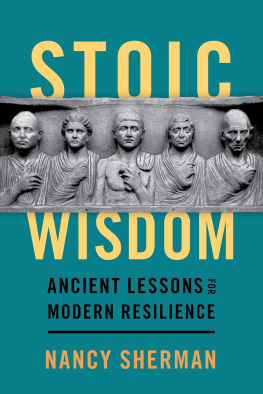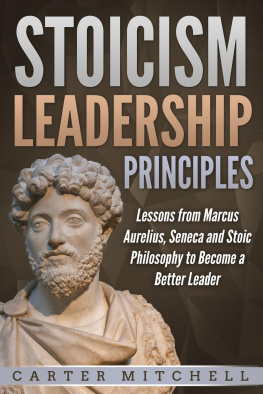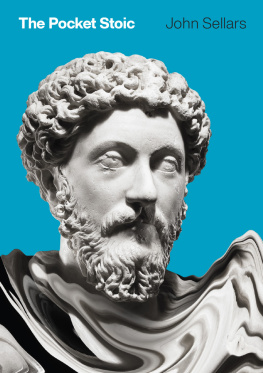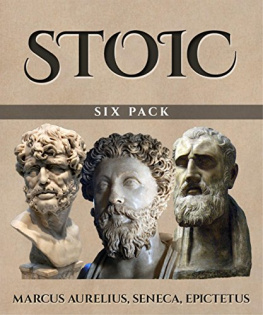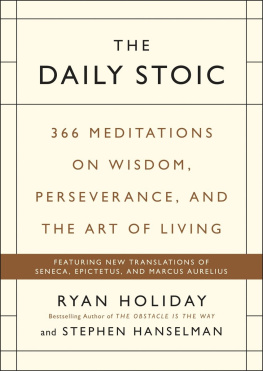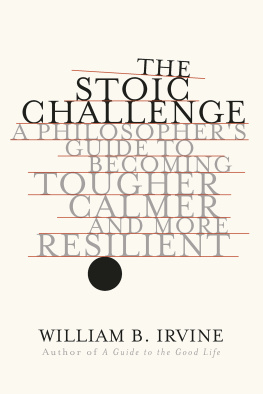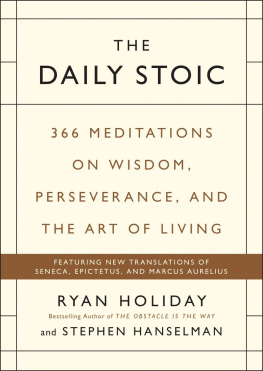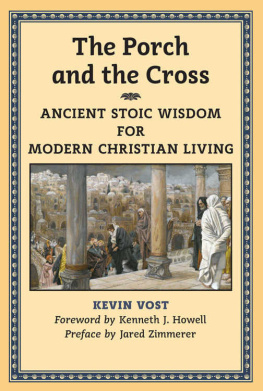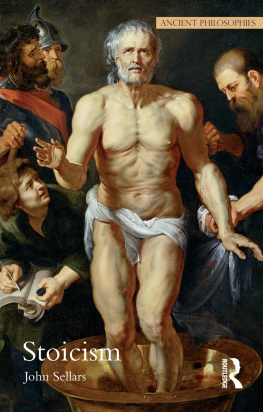STOIC WISDOM
OTHER BOOKS BY NANCY SHERMAN
Afterwar: Healing the Moral Wounds of Our Soldiers
Untold War: Inside the Hearts, Minds, and Souls of Our Soldiers
Stoic Warriors: The Ancient Philosophy Behind the Military Mind
Making a Necessity of Virtue: Aristotle and Kant on Virtue
The Fabric of Character: Aristotles Theory of Virtue
Aristotles Ethics: Critical Essays (Editor)

Oxford University Press is a department of the University of Oxford. It furthers the Universitys objective of excellence in research, scholarship, and education by publishing worldwide. Oxford is a registered trade mark of Oxford University Press in the UK and certain other countries.
Published in the United States of America by Oxford University Press
198 Madison Avenue, New York, NY 10016, United States of America.
Oxford University Press 2021
All rights reserved. No part of this publication may be reproduced, stored in a retrieval system, or transmitted, in any form or by any means, without the prior permission in writing of Oxford University Press, or as expressly permitted by law, by license, or under terms agreed with the appropriate reproduction rights organization. Inquiries concerning reproduction outside the scope of the above should be sent to the Rights Department, Oxford University Press, at the address above.
You must not circulate this work in any other form and you must impose this same condition on any acquirer.
Library of Congress Cataloging-in-Publication Data
Names: Sherman, Nancy, 1951 author.
Title: Stoic wisdom : ancient lessons for modern resilience /
Nancy Sherman.
Description: New York, NY, United States of America : Oxford University
Press, [2021] | Includes bibliographical references and index.
Identifiers: LCCN 2020052426 (print) | LCCN 2020052427 (ebook) |
ISBN 9780197501832 (hb) | ISBN 9780197501856 (epub)
Subjects: LCSH: Stoics. | Resilience (Personality trait)
Classification: LCC B528.S2993 2021 (print) | LCC B528 (ebook) |
DDC 188dc23
LC record available at https://lccn.loc.gov/2020052426
LC ebook record available at https://lccn.loc.gov/2020052427
DOI: 10.1093/oso/9780197501832.001.0001
To Marshall
For his love (and humor) always
Some things are up to us and some are not up to us.
Epictetus
I am no longer accepting the things I cannot change. I am changing the things I cannot accept.
Angela Davis
If you want to be a true professional, do something outside yourself.
Who will take responsibility for raising the next generation?
Ruth Bader Ginsburg
Contents
STOIC WISDOM

Eduardo Rosales, Seneca, 18361873.
A New Zen
Stoicism has made a comebackand a huge one at that. There are Stoic self-help books, digests of Stoic quotes, websites with Stoic wisdom to kickstart your day, podcasts, broadcasts, and online crash coursessome to learn how to become manly, others to become calm, some to learn to meditate Roman style, others to practice abstention, some to learn to take more control, others to take less. Tim Ferriss, the well-known author of The 4-Hour Workweek and popular Silicon Valley thought leader and podcast host, touts Stoicism as the ideal philosophy for entrepreneurs. Its the right operating system, as he puts it, to help train people who dream big to learn when and how to contain their egos. Stoicism has become the new Zen. Its a philosophical practice for reducing stress and cultivating goodness. Beyond the online Stoic community is Stoicon, an international, annual meet-up to help learners of all walks incorporate Stoic practices into their daily lives. The fervor has spread to the alt-right, too, with Stoic enthusiasts championing the great works of Western civilization as a bastion of whiteness and masculinity.
Its fair to say that Stoicism has become the darling of many. But why? For a start, its an accessible philosophy with pithy wisdom. Among its Roman authors and sympathizers were emperors and political advisors, the likes of Cicero, Seneca, and Marcus Aurelius, who had power and class and the gift of letters. In Senecas case, his most famous student was Nero, in need of daily lessons in controlling rage and anger. The political climate then was ripe for Stoicisma philosophy of calm in the face of imperial power and intrigue. There are parallels today.
But Stoicism never was just for the elite. It was also for enslaved persons, such as Epictetus, who in a remarkable irony of history went on to inspire an emperor, Marcus Aurelius, to write his own Stoic meditations. The Meditations were meant for Marcuss eyes only, private reflections written at nightfall in a tent along the Danube during the Germanic campaigns. The nighttime journaling was to remind himself, as emperor and general, of the importance of humility and reason-based virtue in the face of his unlimited power. Marcus embraced Epictetuss message that we have power over our own minds and not outside events. Our well-being hangs on our judgments about what affects us and not on brute, uninterpreted objects or events. We are, by default, interpreters of the world. There is no unfiltered experience. In this the Stoics were prescient.
But why is Stoicism the new Zen of the West now? In part, the need for finding calm is ever pressing in Western culture. In the start-up tech world, work weeks can be manic, the lead-up to new funding rounds even tougher, and the pressure to design products that are both user-friendly and examples of smart engineering leads to stress and burnout at all levels. Life-hacking, or creating shortcuts for living efficiently and well, has gained a new attraction. Stoicism appeals to many as offering time-honored workarounds. For the alt-right, it has the additional badge of being a philosophy of dead white men.
The Covid-19 pandemic added a new layer of anxiety for everyone as people faced new stresses from social isolation, job losses, massive death, and basic fear. The pandemic made it abundantly clear that we need ways of preparing ourselves, emotionally and psychologically, for worst-case scenarios. In short, we are hungry for ways of dialing down anxiety and tempering despair. There is a call for self-help and for self-calm. For those looking for counsel and wisdom in the traditional Western canon, Stoicisms Greco-Roman roots give it a seal of approval. Its recognizable imprint in much of the Western thought that followed makes it all the more approachable. On top of that, its a philosophy (at least the Roman school of Stoicism) that is and always has been not just contemplated, but practiced. Its pivotal idea is not to get rid of self, as Zen Buddhism teaches, but to strengthen self-mastery, while still recognizing its limits. Practicing Stoicism was for the ancients, and is now for so many moderns, a way to build resilience. Its methods are psychological but also philosophical and normative, tied to living a life of virtue and character. The goal is inner strength, woven through and through with goodness rooted in reason. The merger is unbeatable: ancient virtue ethics meets modern life-management skills.

